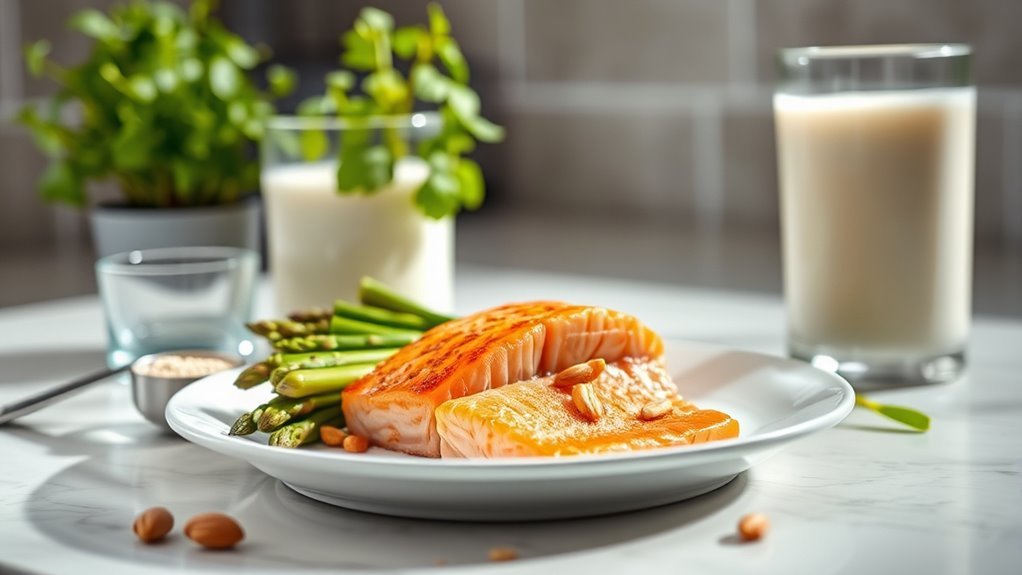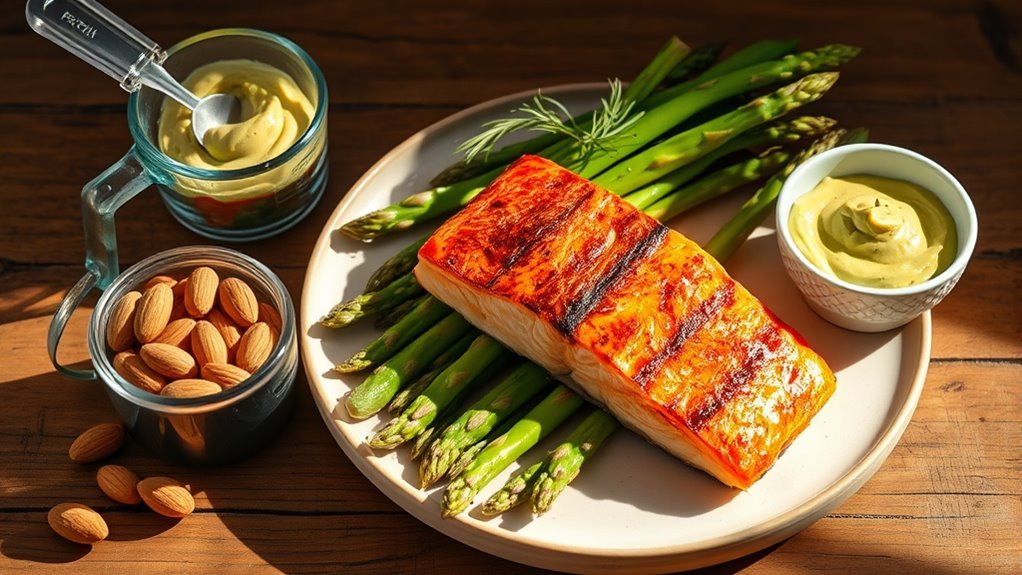For women with osteoporosis on a keto diet, aim for a protein intake of 1.2 to 1.5 grams per kilogram of your body weight. This amount supports bone health by promoting bone matrix formation and reducing fracture risk. Focus on high-quality protein sources like lean meats, dairy, and plant-based options. Balancing your protein with healthy fats and low-carb veggies is also essential. Discover more tips to optimize your diet and enhance your bone health.
Understanding Osteoporosis and Its Nutritional Needs

While you may not think about it often, understanding osteoporosis and its nutritional needs is essential for maintaining bone health, especially for women. Osteoporosis causes significant bone density loss, making fractures more likely as you age. This condition often stems from nutritional deficiencies, particularly in calcium and vitamin D, which are vital for bone integrity. Insufficient intake of these nutrients can lead to weakened bones and increased fracture risk. To support your bone health, prioritize foods rich in these vitamins and minerals. Incorporating dairy, leafy greens, and fortified foods can help. Additionally, a well-planned keto diet can provide essential nutrients while promoting overall health. Remember, a well-balanced diet is key in preventing osteoporosis and ensuring your bones remain strong and resilient, giving you the freedom to pursue an active lifestyle.
The Role of Protein in Bone Health

Although often overshadowed by calcium and vitamin D, protein plays an essential role in maintaining bone health. Different protein types, such as whey and collagen, can greatly influence bone density. Adequate protein intake supports the formation of bone matrix, which is essential for strength and stability. Research indicates that higher protein consumption may enhance bone density, particularly in postmenopausal women, who are at an increased risk for osteoporosis. It’s important to balance protein sources within your diet to guarantee you’re getting all the essential amino acids. If you’re considering a ketogenic diet, focus on high-quality proteins to promote bone health while maintaining your nutritional freedom. Prioritizing protein isn’t just about muscle; it’s crucial for your bones too. Additionally, monitoring protein intake is essential to ensure you stay within target ranges while supporting overall health and bone density.
Ketogenic Diet Basics for Women

Understanding the basics of the ketogenic diet is essential for women looking to optimize their health and nutrition. This diet emphasizes high-fat, moderate-protein, and low-carbohydrate intake, which can lead to effective weight management and improved metabolic health. By following specific nutritional guidelines tailored for women, you can enhance your keto experience while supporting your unique dietary needs. Including healthy fats in your meals is crucial for maintaining energy levels and promoting overall well-being.
Keto Diet Fundamentals
The ketogenic diet, or keto, is a low-carb, high-fat eating plan designed to shift your body into a state of ketosis, where it burns fat for fuel instead of carbohydrates. Understanding keto macronutrient balance is essential for success, as it typically consists of around 70% fats, 25% protein, and 5% carbohydrates. One important aspect of the keto diet is monitoring progress, which can help ensure that you’re adhering to your dietary goals effectively.
Here are some key points to take into account for ketogenic meal planning:
- Focus on healthy fats like avocados, nuts, and olive oil.
- Incorporate moderate protein sources such as fish, poultry, and eggs.
- Limit high-carb foods, including grains, sugars, and starchy vegetables.
Nutritional Guidelines for Women
When following a ketogenic diet, it’s significant for women to tailor their nutritional intake to meet their unique physiological needs. Focus on high-quality fats, moderate protein, and low carbohydrates to maintain ketosis. Be mindful of potential nutritional deficiencies, especially in vitamins D and K, calcium, and magnesium, which are vital for bone health. Incorporating nutrient-dense foods like leafy greens, avocados, and fatty fish can help mitigate these risks. While dietary restrictions may limit your options, it’s important to diversify your food sources to guarantee a balanced intake. Prioritize whole, unprocessed foods to promote overall well-being. Ultimately, staying informed and adjusting your diet based on your body’s responses can empower you to thrive on a ketogenic journey. Additionally, monitoring portions of low-carb vegetables and berries can help ensure you stay within your carbohydrate limits while maximizing nutrient intake.
Optimal Protein Intake for Osteoporosis
When it comes to preventing osteoporosis, adequate protein intake is essential for maintaining bone density and strength. You’ll want to focus on high-quality protein sources, such as lean meats, dairy, and plant-based options, to support your skeletal health. Additionally, timing your protein consumption throughout the day can enhance its benefits, ensuring your body has the necessary nutrients for bone repair and maintenance.
Importance of Protein
Adequate protein intake plays an essential role in maintaining bone health, particularly for women at risk of osteoporosis. It’s not just about numbers; the quality of protein matters, too. Consuming enough protein can enhance protein absorption, which is critical for bone density. Additionally, it supports muscle maintenance, helping you stay active and strong.
- Promotes bone density and reduces fracture risk
- Supports muscle health, fundamental for mobility
- Aids in recovery and overall well-being
Sources of Protein
Although protein sources can vary widely, choosing high-quality options is essential for optimizing bone health, especially for women concerned about osteoporosis. Animal-based proteins, like lean meats and dairy sources, provide complete amino acids vital for bone density. Seafood options, rich in omega-3 fatty acids, also support your overall health. On the plant-based side, legumes and legume alternatives, such as chickpeas and lentils, are excellent protein sources, while nuts and seeds make great high protein snacks. Incorporating eggs can offer additional benefits due to their nutrient-rich profile. If you’re struggling to meet your protein needs, consider protein supplements to fill gaps in your diet. Balancing these sources can help you maintain strong bones on a keto plan. Additionally, including healthy fats like avocados in your diet can further support your nutritional needs while adhering to a ketogenic lifestyle.
Protein Timing Strategies
To effectively support bone health while following a keto diet, timing your protein intake can be just as important as the amount you consume. Research suggests that ideal protein timing and meal frequency can enhance muscle protein synthesis and support bone density, especially for women with osteoporosis.
Consider these strategies:
- Distribute protein evenly: Aim for 20-30 grams of protein at each meal to maximize absorption.
- Include protein in snacks: Eating a protein-rich snack between meals can help maintain muscle mass and bone health.
- Prioritize post-workout protein: Consuming protein shortly after exercise can further support recovery and bone density. Additionally, incorporating high-quality animal proteins into your meals can provide essential nutrients that contribute to overall health.
Protein Sources Suitable for Keto
When you’re following a ketogenic diet, selecting the right protein sources is crucial for maintaining your macronutrient balance and supporting overall health. You can choose from a variety of options, including animal-based proteins and plant-based proteins. Dairy options like cheese and Greek yogurt are excellent choices, as they provide protein and healthy fats while being low in carbs.
Here’s a quick overview of suitable protein sources:
| Protein Source | Type | Carb Content (g) |
|---|---|---|
| Chicken Breast | Animal Protein | 0 |
| Tofu | Plant-Based Protein | 1.9 |
| Mozzarella Cheese | Dairy Option | 1.2 |
| Almonds | Plant-Based Protein | 2.9 |
Choosing the right sources helps guarantee you meet your dietary needs while enjoying the freedom of a keto lifestyle. Incorporating keto-friendly fats into your meals also enhances the overall health benefits of the diet.
Balancing Protein With Fats and Carbohydrates
Balancing protein with fats and carbohydrates is essential for effectively following a ketogenic diet, as it helps maintain the metabolic state of ketosis. Achieving a proper protein fat balance guarantees you get the right nutrients while still enjoying the freedom of a varied diet. Remember, carb moderation is key to staying in ketosis.
- Focus on high-quality protein sources like poultry and fish.
- Incorporate healthy fats from avocados, nuts, and olive oil.
- Monitor your carbohydrate intake, aiming for low-carb vegetables and avoiding sugars. Additionally, pairing proteins with healthy fats enhances satiety and supports nutritional balance in your meals.
Tips for Meeting Protein Goals on a Keto Diet
Meeting your protein goals on a keto diet can seem challenging, especially with the emphasis on high-fat intake. However, there are effective strategies to help you stay on track. Start meal prepping to guarantee you have protein-rich meals ready to go. Consider incorporating options like grilled chicken, fish, or eggs into your weekly plan. Snack smart by choosing protein-rich snacks such as nuts, cheese, or beef jerky to keep hunger at bay and meet your protein needs. Don’t forget to explore plant-based sources too, like tempeh or edamame, which can complement your diet. Additionally, it’s crucial to understand daily macronutrient needs to ensure you’re balancing your protein intake effectively. By planning ahead and selecting high-protein options, you’ll find it easier to achieve your goals while enjoying the freedom a keto lifestyle offers.
Frequently Asked Questions
Can Supplements Replace Protein From Food Sources on Keto?
While supplements can be convenient, they shouldn’t replace high-quality protein from food sources. Think of supplements as a safety net, but the real nourishment comes from whole foods. Protein quality matters; whole food sources provide essential amino acids and nutrients that supplements often lack. If you’re pursuing a keto lifestyle, aim for a balanced approach, incorporating both supplement sources and nutrient-dense foods to guarantee you’re meeting your protein needs effectively.
How Does Exercise Affect Protein Needs for Osteoporosis?
Exercise considerably affects your protein needs for osteoporosis. Engaging in weight-bearing and resistance exercise types helps maintain bone density, increasing your protein requirements. To maximize muscle synthesis and support bone health, focus on protein timing—consuming protein shortly after workouts can enhance recovery. Aim for a balanced intake throughout the day to meet your needs, ensuring you’re supporting both your bones and overall wellness while enjoying the freedom of an active lifestyle.
Are There Specific Protein Powders Recommended for Keto?
When it comes to protein powders on keto, you’ve got solid choices. Whey protein is popular for its high biological value, making it an excellent option for muscle maintenance. If you prefer plant-based options, consider pea or hemp protein, which are lower in carbs and still provide essential amino acids. Just make sure to check the labels for any added sugars. With the right powder, you can easily meet your protein goals while staying keto-friendly.
Can Too Much Protein Harm Bone Health?
Yes, too much protein can potentially harm bone health. While adequate protein is essential for maintaining bone density, excessive intake may lead to calcium loss through urine, negatively impacting your bones. It’s vital to balance protein sources with other nutrients like calcium and vitamin D. Aim for a moderate protein intake, especially if you’re on a keto diet, to support both your muscle health and bone integrity without compromising your overall well-being.
What Are the Signs of Protein Deficiency on a Keto Diet?
Imagine your body as a classic car; without enough fuel, it won’t run smoothly. On a keto diet, signs of protein deficiency can include fatigue, muscle loss, weakened immunity, and hair thinning. It’s essential to incorporate quality protein sources like eggs, fish, and nuts to prevent these symptoms. If you’re feeling sluggish or experiencing unexpected weight loss, it might be time to reassess your protein intake to support your overall health.
References
- https://www.ncbi.nlm.nih.gov/pmc/articles/PMC6412700/
- https://ods.od.nih.gov/factsheets/Protein-HealthProfessional/
- https://www.nia.nih.gov/news/what-you-need-know-about-osteoporosis
- https://www.bones.nih.gov/health-info/bone/osteoporosis
- https://www.usda.gov/topics/nutrition-overview/what-protein
- https://www.ncbi.nlm.nih.gov/pmc/articles/PMC4108372/
- https://www.who.int/news-room/fact-sheets/detail/osteoporosis
- https://www.nutrition.gov/topics/nutrition-overview/protein


